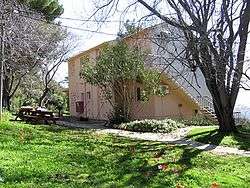Adamit
| Adamit | |
|---|---|
 | |
 Adamit | |
| Coordinates: 33°4′42.27″N 35°12′39.59″E / 33.0784083°N 35.2109972°ECoordinates: 33°4′42.27″N 35°12′39.59″E / 33.0784083°N 35.2109972°E | |
| Council | Mateh Asher |
| Region | Western Galilee |
| Affiliation | Kibbutz Movement |
| Founded | August 1958 |
| Founded by | Hashomer Hatzair members |
| Population (2015) | 175[1] |
Adamit (Hebrew: אֲדָמִית) is a kibbutz in northern Israel. Located in the western Galilee in Israel near the border with Lebanon, it falls under the jurisdiction of Mateh Asher Regional Council. In 2015 it had a population of 175.
History
Kibbutz Adamit was founded in August 1958 by members of Hashomer Hatzair, and was named after a Second Temple period town whose ruins were found in the area.[2] The kibbutz was founded on the land of the depopulated Palestinian village of Khirbat Iribbin, to the west of the village site.[3] In 1967, the kibbutz was abandoned, and only Nahal groups remained. In 1971, the kibbutz was resettled by new immigrants from England, United States and Canada, after a year of training at kibbutz Mishmar HaEmek. During the 1980s, the kibbutz suffering from financial problems and was put under administrative receivership. Since the 1990s, a new build-your-own-home neighborhood has grown up along the hillside.[4]
Geography and climate
The kibbutz is situated on a hill, offering a panoramic view of the Galilee. On one side lies the Nahal Betzet nature reserve, and to the north, Nahal Namer. The region gets 750 millimeters of rainfall a year, which is relatively high for Israel.[4]
Economy
The kibbutz operates a chicken coop, orchards and a metalwork factory. It also rents out vacation cabins to tourists.[4]
References
- ↑ "List of localities, in Alphabetical order" (PDF). Israel Central Bureau of Statistics. Retrieved 16 October 2016.
- ↑ Adamit Shelanu
- ↑ Khalidi, Walid (1992), All That Remains: The Palestinian Villages Occupied and Depopulated by Israel in 1948, Washington D.C.: Institute for Palestine Studies, p. 17, ISBN 0-88728-224-5
- 1 2 3 The good life, on a kibbutz, Haaretz